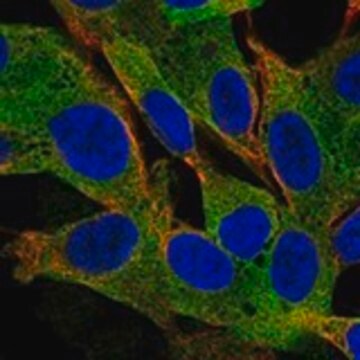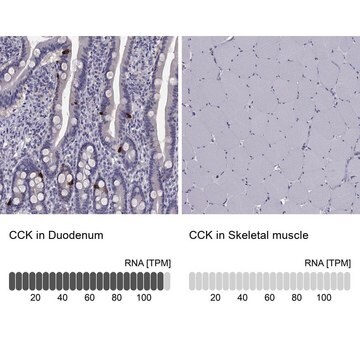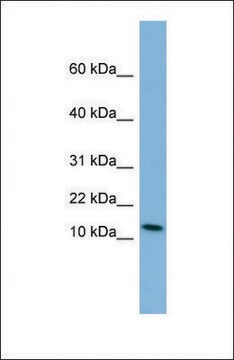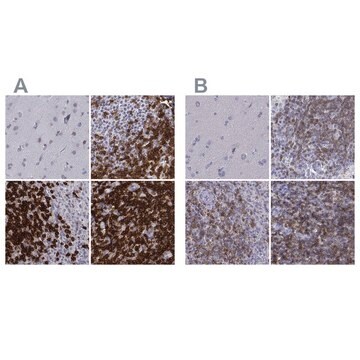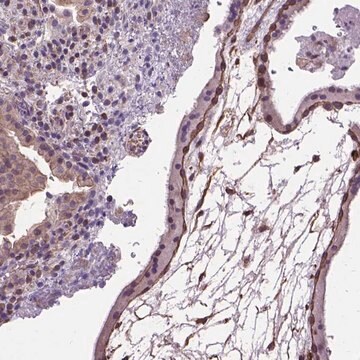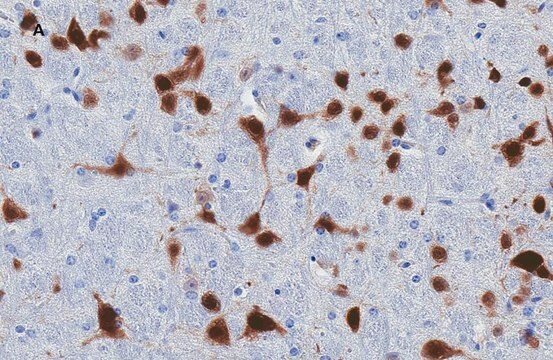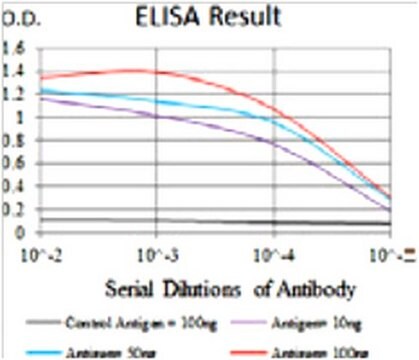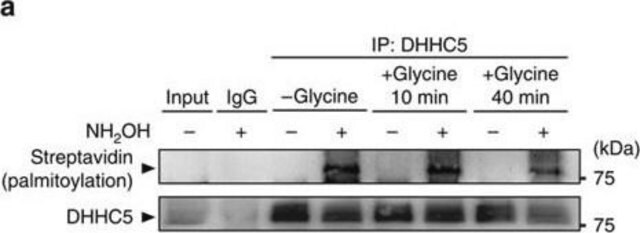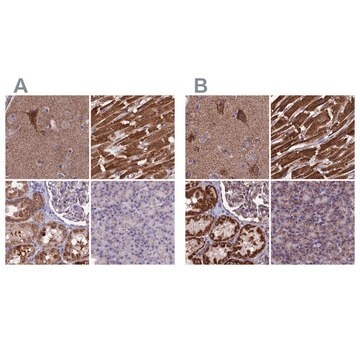推薦產品
生物源
rabbit
品質等級
共軛
unconjugated
抗體表格
affinity isolated antibody
抗體產品種類
primary antibodies
無性繁殖
polyclonal
產品線
Prestige Antibodies® Powered by Atlas Antibodies
形狀
buffered aqueous glycerol solution
物種活性
human
加強驗證
orthogonal RNAseq
Learn more about Antibody Enhanced Validation
技術
immunohistochemistry: 1:500- 1:1000
免疫原序列
PIKPEAPGEDASPEELNRYYASLRHYLNLVTRQRYGKRDGPDRLLSKTFFPDGEDRPVRSRSEGPDLW
UniProt登錄號
運輸包裝
wet ice
儲存溫度
−20°C
目標翻譯後修改
unmodified
基因資訊
human ... PYY(5697)
一般說明
PYY (peptide YY) is a hunger suppressing hormone, composed of 36 amino acids. It is secreted in the mucosa of rectum, colon and distal ileum. Studies show that it is also found on peripheral blood mononuclear cells (PBMC). PYY was initially isolated from the gut of pig, and shares high similarity with neuropeptide Y (NPY) and pancreatic polypeptide (PP). It has a molecular weight of 4307Da. This gene resides on human chromosome 17q21.1.
免疫原
Peptide YY Precursor recombinant protein epitope signature tag (PrEST)
應用
All Prestige Antibodies Powered by Atlas Antibodies are developed and validated by the Human Protein Atlas (HPA) project and as a result, are supported by the most extensive characterization in the industry.
The Human Protein Atlas project can be subdivided into three efforts: Human Tissue Atlas, Cancer Atlas, and Human Cell Atlas. The antibodies that have been generated in support of the Tissue and Cancer Atlas projects have been tested by immunohistochemistry against hundreds of normal and disease tissues and through the recent efforts of the Human Cell Atlas project, many have been characterized by immunofluorescence to map the human proteome not only at the tissue level but now at the subcellular level. These images and the collection of this vast data set can be viewed on the Human Protein Atlas (HPA) site by clicking on the Image Gallery link. We also provide Prestige Antibodies® protocols and other useful information.
The Human Protein Atlas project can be subdivided into three efforts: Human Tissue Atlas, Cancer Atlas, and Human Cell Atlas. The antibodies that have been generated in support of the Tissue and Cancer Atlas projects have been tested by immunohistochemistry against hundreds of normal and disease tissues and through the recent efforts of the Human Cell Atlas project, many have been characterized by immunofluorescence to map the human proteome not only at the tissue level but now at the subcellular level. These images and the collection of this vast data set can be viewed on the Human Protein Atlas (HPA) site by clicking on the Image Gallery link. We also provide Prestige Antibodies® protocols and other useful information.
生化/生理作用
PYY (peptide YY) regulates body mass index and body weight, where decreased levels of PYY are associated with obesity and increased BMI. It decreases hunger and food intake, gastrointestinal motility and hormone secretion by pancreas. It also plays a role in regulating energy homeostasis. Studies suggest that its expression is decreased under pro-inflammatory stimuli, and during the differentiation of monocytes to macrophages. PYY concentrations are also reduced in women with high dietary cognitive restraint (CR) as opposed to women with normal CR. This peptide is altered in various gastrointestinal disorders, and might be one of the causes of chronic idiopathic slow transit constipation (CST). It might also be responsible for the symptoms of inflammatory bowel disease and gastroenteropathy due to long-standing diabetes. However, in some gastrointestinal disorder it might have a positive role, as in the case of systemic sclerosis, celiac disease, and post-intestinal resection state.
特點和優勢
Prestige Antibodies® are highly characterized and extensively validated antibodies with the added benefit of all available characterization data for each target being accessible via the Human Protein Atlas portal linked just below the product name at the top of this page. The uniqueness and low cross-reactivity of the Prestige Antibodies® to other proteins are due to a thorough selection of antigen regions, affinity purification, and stringent selection. Prestige antigen controls are available for every corresponding Prestige Antibody and can be found in the linkage section.
Every Prestige Antibody is tested in the following ways:
Every Prestige Antibody is tested in the following ways:
- IHC tissue array of 44 normal human tissues and 20 of the most common cancer type tissues.
- Protein array of 364 human recombinant protein fragments.
聯結
Corresponding Antigen APREST71923
外觀
Solution in phosphate-buffered saline, pH 7.2, containing 40% glycerol and 0.02% sodium azide
法律資訊
Prestige Antibodies is a registered trademark of Merck KGaA, Darmstadt, Germany
免責聲明
Unless otherwise stated in our catalog or other company documentation accompanying the product(s), our products are intended for research use only and are not to be used for any other purpose, which includes but is not limited to, unauthorized commercial uses, in vitro diagnostic uses, ex vivo or in vivo therapeutic uses or any type of consumption or application to humans or animals.
未找到適合的產品?
試用我們的產品選擇工具.
儲存類別代碼
10 - Combustible liquids
水污染物質分類(WGK)
WGK 1
閃點(°F)
Not applicable
閃點(°C)
Not applicable
Farrell Cahill et al.
PloS one, 9(4), e95235-e95235 (2014-04-20)
PYY is an appetite suppressing hormone. Low circulating PYY has been linked to greater BMI. However data is controversial and this association has not been verified in large human populations. The purpose of this study was to investigate if fasting
Billie Hunne et al.
Cell and tissue research, 378(1), 33-48 (2019-05-03)
This paper provides quantitative data on the distributions of enteroendocrine cells (EEC), defined by the hormones they contain, patterns of colocalisation between hormones and EEC relations to nerve fibres in the rat gastric mucosa. The rat stomach has three mucosal
J L Scheid et al.
Physiology & behavior, 120, 26-33 (2013-07-09)
Acylated ghrelin and peptide YY (PYY3-36) are involved in appetite-regulation and energy homeostasis. These gastrointestinal hormones provide peripheral signals to the central nervous system to regulate appetite and short term food intake, and interact with leptin and insulin to regulate
Fiona M Keane et al.
The FEBS journal, 278(8), 1316-1332 (2011-02-15)
Fibroblast activation protein-α (FAP) is a cell surface-expressed and soluble enzyme of the prolyl oligopeptidase family, which includes dipeptidyl peptidase 4 (DPP4). FAP is not generally expressed in normal adult tissues, but is found at high levels in activated myofibroblasts
Julia Pia Natascha Holler et al.
Peptides, 58, 78-82 (2014-06-28)
Peptide YY is produced by L cells in the mucosa of the distal ileum, colon, and rectum and may have systemic and paracrine functions. We hypothesized that peptide YY is expressed by peripheral blood mononuclear cells. The purpose of the
我們的科學家團隊在所有研究領域都有豐富的經驗,包括生命科學、材料科學、化學合成、色譜、分析等.
聯絡技術服務
